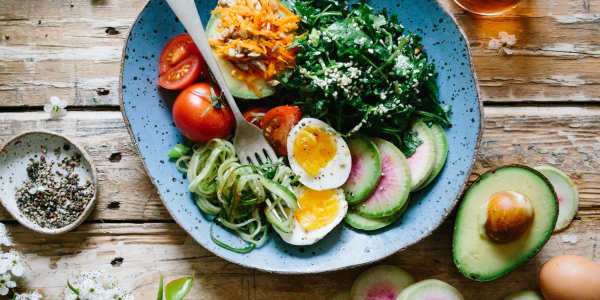Have you ever stepped on the ice feeling full and bloated from a meal you ate minutes before getting dressed?
Or, have you ever started to feel tired half-way through a game because you didn’t eat enough and don’t have enough energy to last?
If so, then you likely didn’t eat the right foods or eat at the right time and your performance on the ice ultimately suffered.
Nutrition is a fundamental factor that gives you the energy needed to perform. What and when you eat prior to a game is extremely important for optimal performance. How you fuel your body will affect the amount of energy you have available and can be the difference between lasting the full three periods and crashing half-way through the game.
In this article, we’ll discuss optimal pre-game meal choices, and when you should eat that meal.
Before we dive in, it’s important to keep in mind that your pre-game meal is only one piece of the puzzle when it comes to game day nutrition. What you eat throughout the day is equally as important and shouldn’t be just an afterthought. You need to maintain your blood glucose levels throughout the day for sustained energy. For more information on how to properly fuel your body throughout the day visit (insert link).
The goal of your pre-game meal is to provide enough energy to prevent fatigue (low blood sugar) and maintain optimal athletic performance. The timing and amount of food consumed prior to each game is specific to the individual, however, the following guidelines will help you figure out what works best for you.
Generally speaking, you want to consume your pre-game meal 2-3 hours before hitting the ice. It is important that you do not eat too close to puck drop. You need enough time for digestion to occur in order to replenish fuel (glycogen) stores in muscles. Also, being fully digested will allow for optimal exertion and performance without stomach discomfort. Through trial and error you will be able to figure out what your optimal digestion window is.
Now that you know when to eat your pre-game meal, the big question is, what to eat? Of all three macronutrients (carbohydrates, protein and fat), carbohydrates make for the best pre-game food. Carbs are digested quickly and can be taken into your muscles easily. That being said, your pre-game meal should consist of higher carbs, moderate protein, and low fat. We typically recommend low fat to prevent digestion issues, as fat slows down the rate of digestion and absorption of key nutrients into the bloodstream.
So, what can you eat with this macronutrient breakdown? Well, you have a lot of options and foods that you can choose from for your pre-game meal, but to simplify things, we’ve provided you with a few meal ideas for optimal performance:
Icelandic Yogurt:
- ¾ Cup Plain Icelandic Yogurt
- 1 Cup Cereal of Choice
- 1 Tbsp Powdered Peanut Butter
- ½ Banana
- Cinnamon to Taste
Granola + Ultrafiltered Skim Milk:
- ⅔ Cup Kind Granola - Any Flavour
- ½ Cup Ultrafiltered Skim Milk
- ½ Banana
Banana Pancakes:
- ½ Banana
- ½ Scoop Protein Powder
- ¼ Cup Egg Whites
- ¼ Cup Steel Cut Oats
- 1 tsp Baking Powder
- 3 Tbsp ED Smith Maple Syrup
PB + Jam Sandwich:
- 2 Slices Bread
- 1 Tbsp Peanut Butter
- 1 Tbsp Jam
- ½ Banana
- ½ Scoop Protein Powder
Lean Protein (Chicken Breast) + Rice + Veg:
- 2 Oz Chicken Breast
- ½ Cup Rice Cooked
- 2 Cups of Green Vegetables
- 2 Tbsp Hummus
Lean Protein + Sweet Potato + Veg:
- 2 Oz Lean Protein
- 4 Oz Sweet Potato
- 2 Cups of Green Vegetables
- 2 Tbsp Hummus
- 2 Tbsp Ketchup
Cottage Cheese + Fruit:
- 1 Cup Low Fat Cottage Cheese
- 1 Cup of Berries of Choice
- ½ Cup of Granola of Choice
Ground Lean Meat + Quinoa + Fruit/Veg:
- 1 Cup Quinoa Cooked
- 3 Oz Extra Lean Ground Meat
- 1 Cup of Green Vegetables
- ½ Banana
In addition to your pre-game meal, you need to consume plenty of water to help aid with digestion and keep you hydrated for your game. We recommend that you drink at least 2.5 Litres of water/day, consuming extra prior, during, and after each game.
Lastly, beyond your pre-game meals - some hockey players find it helpful to consume quick digesting snacks an hour (60 minutes) before game-time can be helpful for sustaining energy levels needed to sustain energy. With that being said, eating a piece of fruit is always a great go-to snack option. Fruit helps with hydration and the higher carbohydrates (simple sugars) are easily digested into the bloodstream.
Each hockey player has individual nutrition needs, and while these guidelines are helpful to all players, we type that you try different meals/meal timing to find what works best for your performance. The more dialed into your nutrition you are, the better you’ll be at figuring out what foods give you lasting sustainable energy. Learn exactly what and when to eat to get the most out of your performance.
Get serious about your nutrition and take your game to the next level!

Kyle is a Hockey Performance Specialist who’s worked with hundreds of hockey players from Peewee to Pro. A former elite hockey player, Kyle earned his degree in Kinesiology before becoming a Strength Coach that specializes in hockey performance. Today, he runs Relentless Hockey where he works with players across the world, including pros in over 20+ leagues including the NHL, KHL, and OHL.




